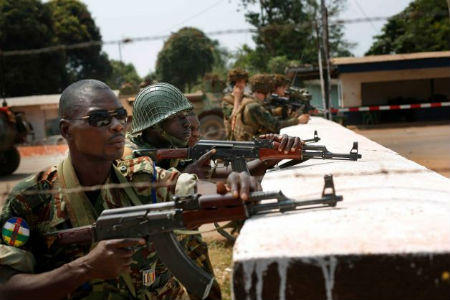
The government of Chad said Thursday it is withdrawing more than 800 peacekeepers from a mission to stabilize neighboring Central African Republic after the Chadian troops came under scrutiny for firing into a crowd of civilians last week, killing at least 32 people.
Chad has been a key player in the Central African Republic crisis that deepened in December when the country exploded into sectarian bloodshed. Chad’s forces have been instrumental in the effort to evacuate Muslims across the northern border into Chad, a predominantly Muslim nation, with the help of its peacekeepers.
“I leave my fate now only in the hands of God,” said Aboubakar Moussa, who remains in PK5, one of the last neighborhoods where Muslims still live after a mass exodus following brutal violence in Bangui earlier this year.
Chadian Foreign Affairs Minister Moussa Faki Mahamat cited a “gratuitous and malicious campaign” against the Chadians, in announcing the decision. He said their forces had been blamed for the problems and suffering in Central African Republic despite having made considerable sacrifices.
The announcement comes just days after Chadian troops were accused of killing 32 civilians when they opened fire on a crowd over the weekend. The African peacekeeping mission known as MISCA later defended the Chadians, saying they had come under attack first from the armed Christian militants who deeply despise the presence of Chadian forces on Central African soil.
The Chadian troops also were accused of supporting the Muslim rebel government known as Seleka that left power in January.
“They are assassins and accomplices of the Seleka. It’s high time that they left,” said Zephirin Koualet, a Bangui civil servant.
The major concern now is what will happen if Chad’s President Idriss Deby “just withdraws in a huff” from the international effort to try to stabilize Central African Republic, said Peter Bouckaert, emergencies director for Human Rights Watch.
“It’s very much left open how long (a withdrawal) will take or whether this is just a bargaining tactic by Deby to try to get the international community to stop criticizing the actions of his troops,” he said.
In addition to the civilian deaths, the Chadian forces within MISCA have also been accused of failing to coordinate their actions with other peacekeepers, at times engaging in rogue activities including helping the Muslim rebels known as Seleka to move freely about the country, human rights groups say.
“They consider themselves the saviors of the Central African Republic who’ve evacuated so many tens of thousands of Muslims and any kind of criticism is just unacceptable from their point of view,” Bouckaert said. “Their role is very important in the Central African Republic but at the same time a situation where they can just do as they please and fire on the civilian population and facilitate Seleka movements is just not acceptable.”
Chad and its president have long played a complicated role in the crisis in its southern neighbor Central African Republic. While Chadian troops helped bolster the now-ousted government of Francois Bozize in Central African Republic, Chadian mercenary fighters helped Muslim rebels overthrow his government in March 2013.
Those same Chadian fighters later were accused of carrying out some of the worst atrocities against Christians in the country, and as a result all Chadian nationals have been targeted for attack since the Muslim rebel government dissolved in January. The Christian anti-Balaka fighters – known for wearing amulets they say protect them from gunfire – have killed hundreds of Muslims on the streets of Bangui since the rebel government fell.
There are also Chadian special forces operating in Central African Republic who are outside the mandate of the peacekeeping mission.
France has sent 2,000 troops and other African nations have contributed more than 5,000 peacekeepers to the effort. There is a universal recognition that more forces are needed, and calls have been growing for the effort to be transformed into a U.N. peacekeeping mission. However, such an effort would take months to mobilize and put in place, experts say.
—
